Smart Cities Market Overview
The Smart Cities Market Size is expected to reach USD 1320.21 Billion by 2033. The Smart Cities Market industry size accounted for USD 542.26 Billion in 2023 and is expected to expand at a compound annual growth rate (CAGR) of 16.02% from 2023 to 2033. Smart cities are urban areas that utilize information and communication technologies (ICT) and data-driven solutions to improve efficiency, sustainability, and the quality of life for both residents and visitors. These cities integrate a variety of digital technologies, such as Internet of Things (IoT) sensors, artificial intelligence (AI), and advanced data analytics, to optimize infrastructure and services across multiple sectors, including transportation, energy, healthcare, public safety, and environmental management. The primary objective of smart cities is to tackle urban challenges, such as traffic congestion, pollution, inadequate public services, and resource management, by leveraging real-time data insights to inform decision-making and enhance urban planning and governance. Ultimately, the aim is to create urban environments that are more livable, resilient, and inclusive, fostering economic growth, environmental sustainability, and social well-being.
Global Smart Cities Market Synopsis
The Global Smart Cities Market experienced significant repercussions from the COVID-19 pandemic. Initially, lockdowns and social distancing measures disrupted ongoing smart city projects, resulting in delays in their implementation and deployment. Moreover, economic uncertainty and budget constraints compelled governments and organizations to prioritize spending elsewhere, diverting resources away from smart city initiatives. However, the pandemic underscored the critical role of digital infrastructure and remote technologies in managing urban challenges and fostering resilience, sparking a renewed emphasis on smart city solutions. Technologies like IoT, AI, and data analytics emerged as key players, facilitating remote monitoring, contactless services, and real-time decision-making to address pandemic-related issues such as healthcare management, public safety, and remote work. Consequently, the pandemic accelerated the adoption of smart city technologies and solutions, paving the way for long-term growth opportunities in the Global Smart Cities Market.
Smart Cities Market Dynamics
The major factors that have impacted the growth of Smart Cities Market are as follows:
Drivers:
Ø Urbanization and Population Growth
The rapid pace of urbanization and population growth worldwide serves as a significant driver for the Smart Cities Market. As more people move to urban areas, the demand for efficient and sustainable urban infrastructure and services increases, driving the adoption of smart city solutions to address challenges such as traffic congestion, pollution, and resource management.
Restraint:
- High Implementation Costs and Infrastructure
The growth of the Smart Cities Market is the high implementation costs and infrastructure challenges associated with deploying smart city solutions. Building and integrating the necessary digital infrastructure, including IoT sensors, data analytics platforms, and connectivity networks, can be costly and complex. Additionally, challenges such as interoperability issues, data privacy concerns, and regulatory hurdles can impede the deployment of smart city projects.
Opportunity:
⮚ Technological Advancements and Innovation
The continual advancement of technology, including IoT, AI, cloud computing, and 5G networks, presents significant opportunities for the Smart Cities Market. These technological advancements enable the development of more sophisticated and scalable smart city solutions, enhancing efficiency, sustainability, and quality of life in urban areas. Moreover, innovation in areas such as digital twins, autonomous vehicles, and smart grids opens up new possibilities for addressing urban challenges and creating more resilient and inclusive cities.
Smart Cities Market Segment Overview
By Component
 Based on Component, the market is segmented based on Hardware, Software, and Services. The Hardware segment has asserted dominance in the global Smart Cities market due to the crucial role of physical infrastructure in enabling smart city solutions. This segment encompasses various components such as IoT sensors, connectivity devices, and hardware platforms, which form the backbone of smart city deployments, driving efficiency, connectivity, and data collection for urban management.
Based on Component, the market is segmented based on Hardware, Software, and Services. The Hardware segment has asserted dominance in the global Smart Cities market due to the crucial role of physical infrastructure in enabling smart city solutions. This segment encompasses various components such as IoT sensors, connectivity devices, and hardware platforms, which form the backbone of smart city deployments, driving efficiency, connectivity, and data collection for urban management.
By Application
Based on Application, the market segment has been divided into the Smart Governance, Smart Energy, Smart Building, Smart Utilities, Smart Transportation, Smart Healthcare, and Others. The Smart Governance segment leads the Smart Cities market, showcasing the importance of data-driven decision-making and digital governance frameworks in urban management. Leveraging technologies like AI, data analytics, and citizen engagement platforms, this segment empowers city administrators to optimize resource allocation, enhance service delivery, and foster transparent and participatory governance practices, driving efficiency and innovation in urban governance.
Global Smart Cities Market Regional Analysis
Based on region, the global Smart Cities Market has been divided into North America, Europe, Asia-Pacific, the Middle East & Africa, and Latin America. North America is projected to dominate the use of the Smart Cities Market followed by the Asia-Pacific and Europe regions.
 Smart Cities North America Market
Smart Cities North America Market
North America holds a dominant position in the Smart Cities Market, driven by advanced digital infrastructure, robust investments in technology innovation, and government initiatives promoting smart city development. The region’s leadership in sectors like IoT, AI, and data analytics further solidifies its position as a key player in shaping the future of urban living through smart city solutions.
Smart Cities Asia-Pacific Market
The Asia-Pacific region has indeed emerged as the fastest-growing market for the Smart Cities industry, fueled by rapid urbanization, increasing investments in digital infrastructure, and government initiatives promoting smart city development. With countries like China, India, and Singapore leading the way, the region is witnessing a surge in smart city projects aimed at addressing urban challenges and improving quality of life through innovative technology solutions.
Competitive Landscape
The global Smart Cities Market is highly competitive, with numerous players offering a wide range of software solutions. The competitive landscape is characterized by the presence of established companies, as well as emerging startups and niche players. To increase their market position and attract a wide consumer base, the businesses are employing various strategies, such as product launches, and strategic alliances.
Prominent Players:
- IBM Corporation
- Ericsson
- Honeywell
- Huawei Technologies Co Ltd.
- AT&T Inc.
- Siemens AG
- Hitachi Corporation
- Cisco Systems, Inc.
- Oracle Corporation
- Microsoft Corporation
- Schneider Electric SE
Key Development
In June 2023, ABB revealed its acquisition of Eve Systems, a Munich-based frontrunner in smart home products with operations spanning the United States and Europe, as a strategic move to fortify its smart home technology portfolio. This acquisition is geared towards meeting the escalating demand for intelligent, secure, and eco-friendly retrofitting of buildings, driven by evolving energy prices and climate policies.
Similarly, in June 2023, Siemens AG unveiled Egypt’s inaugural Smart Cities Experience Centre, designed to provide customers with an immersive fusion of digital and physical worlds. The center will showcase cutting-edge technologies aimed at crafting efficient and sustainable smart city infrastructure, buildings, and industries. Through this innovative concept, visitors will gain insight into the advantages of transforming existing communities into smart cities.
Scope of the Report
Global Smart Cities Market, by Component
- Hardware
- Software
- Services
Global Smart Cities Market, by Application
- Smart Governance
- Smart Energy
- Smart Building
- Smart Utilities
- Smart Transportation
- Smart Healthcare
- Others
Global Smart Cities Market, by Region
- North America
- US
- Canada
- Mexico
- Europe
- UK
- Germany
- France
- Italy
- Spain
- Benelux
- Nordic
- Rest of Europe
- Asia Pacific
- China
- Japan
- South Korea
- Indonesia
- Austalia
- Malaysia
- India
- Rest of Asia Pacific
- South America
- Brazil
- Argentina
- Rest of South America
- Middle East & Africa
- Saudi Arabia
- UAE
- Egypt
- South Africa
- Rest of Middle East & Africa
| Parameters | Indicators |
|---|---|
| Market Size | 2033: $1320.21 Billion |
| CAGR | 16.02% CAGR (2023-2033) |
| Base year | 2022 |
| Forecast Period | 2023-2033 |
| Historical Data | 2021 |
| Report Coverage | Revenue Forecast, Competitive Landscape, Growth Factors, and Trends |
| Key Segmentations | Component, Application |
| Geographies Covered | North America, Europe, Asia-Pacific, Latin America, Middle East, Africa |
| Key Vendors | IBM Corporation, Ericsson, Honeywell, Huawei Technologies Co Ltd., AT&T Inc., Siemens AG, Hitachi Corporation, Cisco Systems, Inc., Oracle Corporation, Microsoft Corporation, Schneider Electric SE |
| Key Market Opportunities | • Technological innovations driving smart city solutions. • Government initiatives and funding for smart city projects. • Rising awareness and demand for improved quality of life in urban areas |
| Key Market Drivers | • Increasing urbanization and population growth. • Growing demand for efficient and sustainable urban infrastructure. • Advancements in technology, such as IoT, AI, and data analytics |
REPORT CONTENT BRIEF:
- High-level analysis of the current and future Smart Cities Market trends and opportunities
- Detailed analysis of current market drivers, restraining factors, and opportunities in the future
- Smart Cities Market historical market size for the year 2021, and forecast from 2023 to 2033
- Smart Cities Market share analysis at each product level
- Competitor analysis with detailed insight into its product segment, Government & Defense strength, and strategies adopted.
- Identifies key strategies adopted including product launches and developments, mergers and acquisitions, joint ventures, collaborations, and partnerships as well as funding taken and investment done, among others.
- To identify and understand the various factors involved in the global Smart Cities Market affected by the pandemic
- To provide a detailed insight into the major companies operating in the market. The profiling will include the Government & Defense health of the company’s past 2-3 years with segmental and regional revenue breakup, product offering, recent developments, SWOT analysis, and key strategies.





